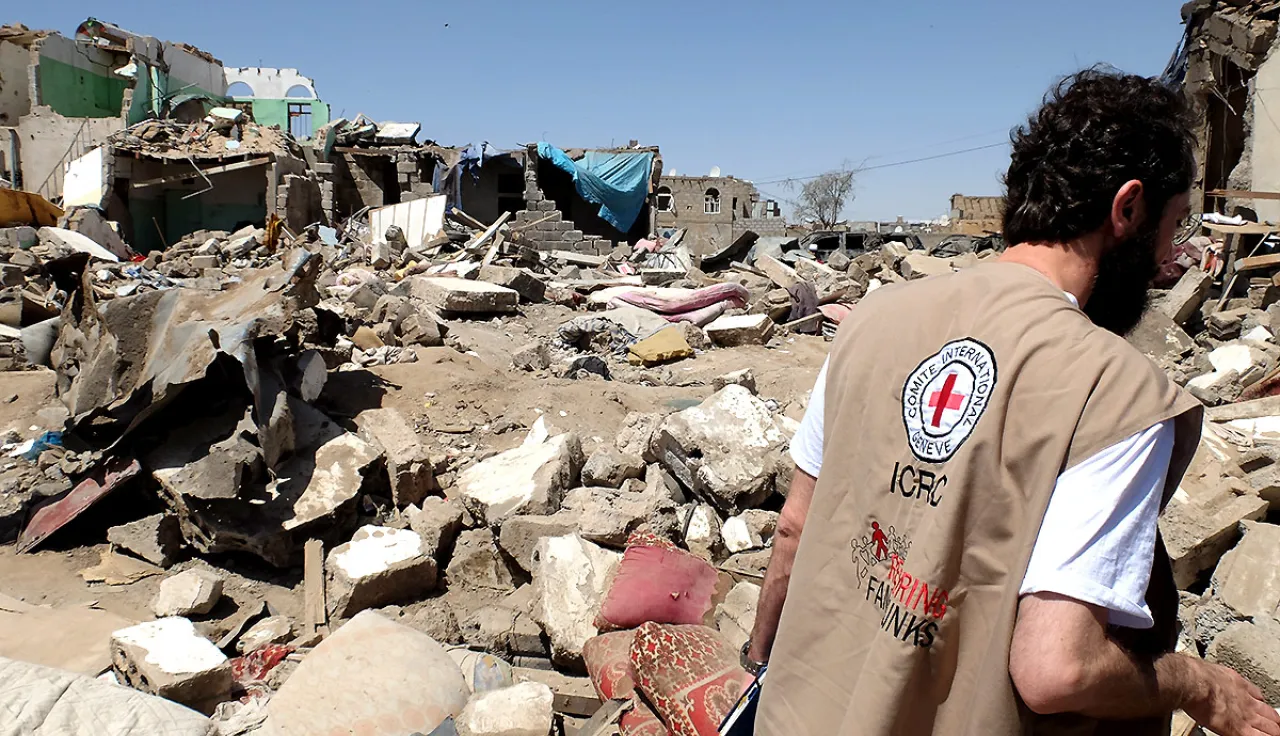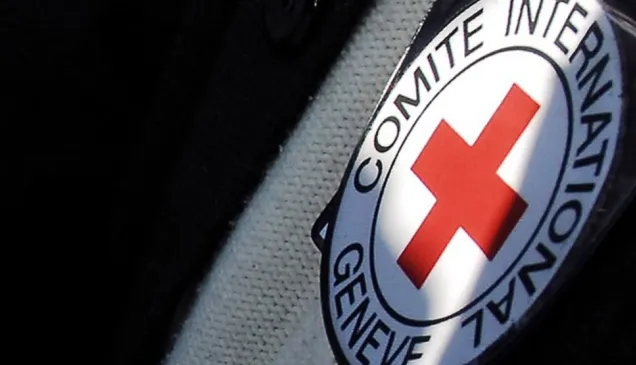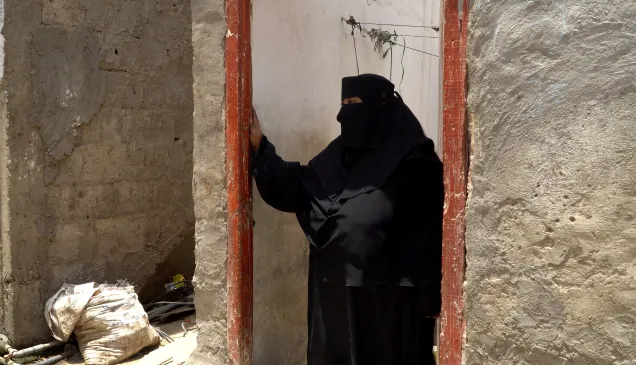Sana'a/Geneva – The International Committee of the Red Cross (ICRC) on Tuesday called for the urgent removal of obstacles to the delivery to Yemen of vital medical supplies needed to treat casualties from a week of deadly clashes and air strikes.
A shipment of ICRC medical supplies sufficient to treat from 700 to 1,000 people was due to arrive by plane on Tuesday for distribution to hospitals across the country that are running low on the means to treat the war wounded.
So far, efforts to negotiate the safe arrival of the plane have not been successful.
"There are casualties across the country. There have been air strikes in the north, west and south, and clashes between opposing Yemeni armed groups in the center and south, that are putting immense strain on already weak medical services," said Cedric Schweizer, who heads an ICRC team of 300 people in Yemen.
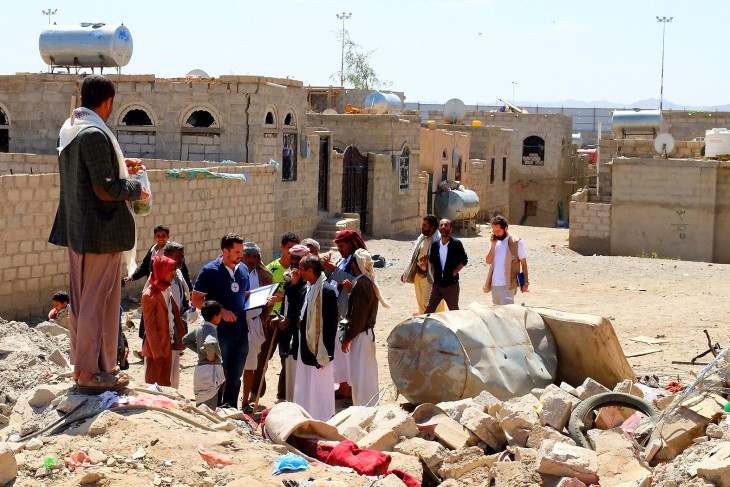
Sana'a, Yemen, 29 March 2015. ICRC teams talk to people whose houses have been damaged or destroyed in air strikes. [CC BY-NC-ND / ICRC / S. Ammane / v-p-ye-e-01089]
"In order that the wounded get the treatment they deserve, it's essential we deliver urgent medicines and surgical kits," he added.
An ICRC surgical team is due to arrive shortly in the southern city of Aden, where casualty numbers have been greatest.
The ICRC has demanded that humanitarian workers be allowed to work safely, after a Yemeni Red Crescent volunteer, Omar Ali Hassam, was shot dead on Monday in the southern province of A Dhalea while evacuating wounded people.
The ICRC also expressed concern at the high number of civilian casualties and reiterated that those engaged in the armed conflict must respect international humanitarian law (IHL), which protects those taking no part in fighting, and make every effort to protect civilian life and property from harm.
Under IHL it is forbidden to launch attacks that might lead to incidental losses among civilians or cause the destruction of civilian objects that would be disproportionate to the concrete and direct military advantage anticipated.
The six nights of air strikes and heavy ground combat come on top of years of conflict, drought and insecurity that has left much of the population struggling to find basic health, food and water supplies.
The ICRC has offices in Sana'a, Saada, Aden and Taiz, which are continuing their humanitarian activities.
Ensuring a quick medical response
In the southern governorates, the ICRC has stepped up support for hospitals as Ministry of Health facilities are struggling to cope with the influx of wounded from clashes and street battles.
The ICRC has helped reopen the 22 May Hospital in Aden and provided a kit containing medical supplies to treat between 50 and 70 war-wounded patients. Triage tents were erected at the Al Jomhouri hospital, one of the main treatment centers in Aden, which will speed up patient assessment and referral. Medical centers in the nearby southern provinces of Taiz, Lahj and Al Dhalea have also received ICRC support. Efforts to continue to ensure the region's hospitals have a supply of clean water.
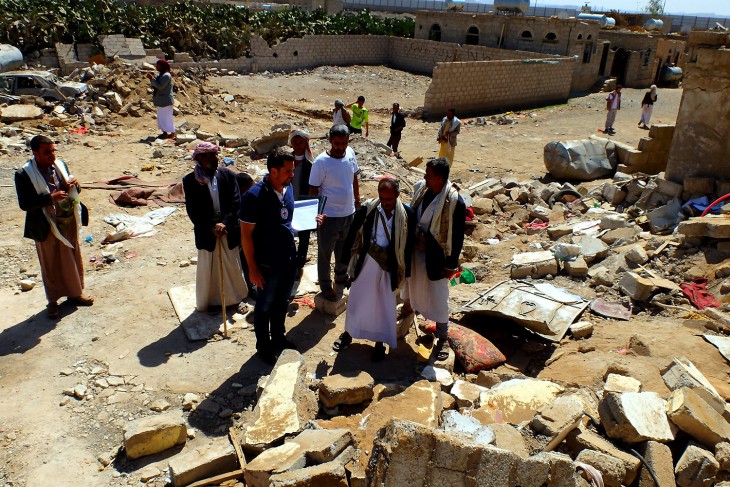
Sana'a, Yemen, 29 March 2015. ICRC teams talk to people whose houses have been damaged or destroyed in air strikes. [CC BY-NC-ND / ICRC / S. Ammane / v-p-ye-e-01090]
In Saada the situation remains extremely tense with continued air strikes in the northern province. The ICRC has supplied medicine to the Al Munabeh hospital and the city's Al Jomhouri hospital which has been receiving a steady stream of war wounded patients. It has also helped repair the generator at the second medical facility.
In the capital Sana'a, air strikes across the city have continued, straining the capital's medical services. In response to the Al-Hoshoosh and Badr mosque bombings in the city on March 20th that killed at least 140 people and injured 340, the ICRC provided two full war wounded kits and other medical supplies to the three hospitals dealing with most of the casualties.
For further information, please contact:
Marie Claire Feghali, ICRC Sana'a, tel: +967 73 607 19 67, +967 71 194 4343
Sitara Jabeen, ICRC Geneva, tel: +41 22 730 24 78 or +41 79 536 92 31

